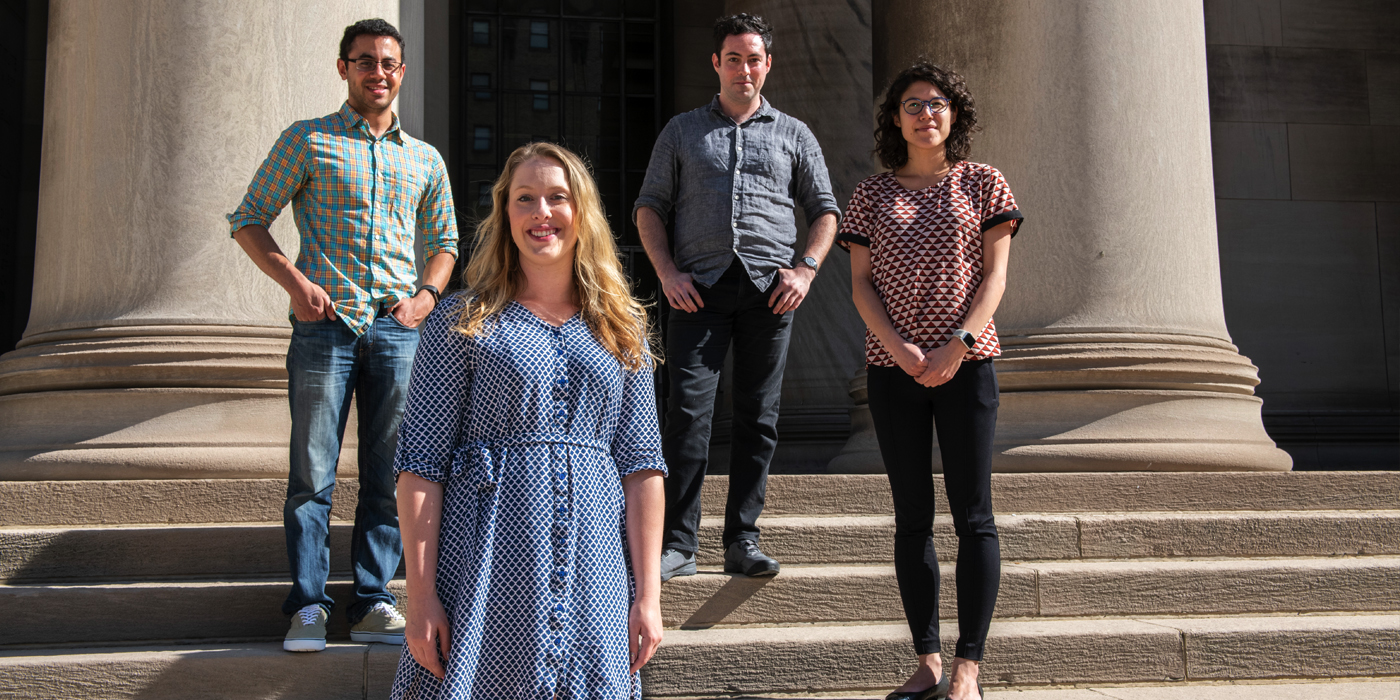Graduate Student Grassroots Brings Career Development into Focus

Four biological sciences Ph.D. candidates, Amber Lucas, Ardon Shorr, Emily Simon and Dan Wilson, have taken up the charge to bring career development training to the forefront at the Mellon College of Science as members of the Biology Graduate Student Action Committee (bioGSAC).
Lucas and her peers started bioGSAC in September 2017 to help make graduate students’ voices heard.
“We started this grassroots organization to address things that graduate students are concerned with,” Lucas said. “When we asked everyone for a priority list of what’s most important to them, career development options and resources were high on the list.”
From there, Shorr, Simon and Wilson jumped on board to spearhead bioGSAC’s Career Development Committee (CDC) along with Lucas.
“I had no idea what kind of jobs were out there outside of the academic options that we are always told about,” Wilson said. “And the few job titles I did know about, I knew nothing about the actual day-to-day and what you need to do to prepare yourself for those roles.”
That’s exactly what the group set out to change. They brought in alumni speakers, hosted professionals for career visits and presented a number of workshops.
It’s exciting to know that a small group can have such a big influence on a college-wide level.
Shorr presented an initial workshop during the spring semester that focused on transitioning into industry and getting into non-academic careers, which he believes reflects the changing economic landscape of graduate education.
"When we transition to non-academic careers, we have to rethink how to talk about our Ph.D. training,” Shorr said. “Our education is more than just depth in a subfield — a Ph.D. is about learning to structure an unstructured problem. That's an incredibly valuable skillset in the changing world of business, politics and consulting."
Lucas followed up by presenting three workshops this summer that focused on teaching students how to search for postdoctoral opportunities, how to identify and talk about their Ph.D. skills in interviews, and how to craft an elevator pitch and build a professional network. Following the workshops, the bioGSAC CDC and MCS threw a networking happy hour so students could unwind and practice what they learned throughout the summer among fellow MCS graduate students, faculty, staff and alumni.
“Most of us aren’t going to end up in academia. Being able to explore different career paths and develop your skills for what you want to do is really important,” Lucas said.
In just a short amount of time, the group has made a lot of waves. They received funding from the Department of Biological Sciences, which will help them continue their efforts on a bigger scale. Their main focus will be on bringing in biology-specific alumni and speakers to campus throughout the year.
This fall, Shorr was hired to expand the program into a series of science communication and professional development workshops for MCS graduate students.
They are grateful to see the work they have done is making a difference at MCS.
“I’ve been working on my own career exploration and job searching, and I had to learn a lot of these tasks the slow and hard way,” Simon said. “But now I’ve been able to talk to younger students who are farther from graduating and give advice and mentorship to them. It’s been enriching to pass on the knowledge I’ve gained.”
“One thing that’s been amazing for me is that there are always all these things you want to change, and you feel there’s no way you can do that or that nobody will listen to you,” Lucas said. “This was the perfect example of if you want something done and you get a good group of people together to make it happen, you can change anything. It’s exciting to know that a small group can have such a big influence on a college-wide level.”
By Emily Payne | epayne@andrew.cmu.edu
